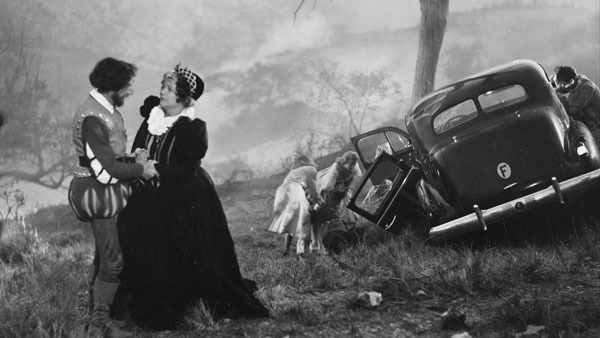It’s been fascinating to watch Demi Moore’s metamorphosis over the years, from sweet, innocent little thing to full-fledged sexpot. Here, in 1996’s “Striptease,” she’s in all-out hottie mode, aided and abetted by her most voluptuously toned, sculptured, and augmented physique to date.
Adapted and directed by Andrew Bergman (“The Freshman,” “Honeymoon in Vegas”) from a satiric novel by Carl Hiaasen, “Striptease” the movie seems little more than an exercise in showing off Ms. Moore’s most-obvious physical assets. And a few other people’s assets as well. If author Hiaasen meant his novel as some kind of satire, it’s unclear from the movie just what anybody intended as the target of that satire. With the exception of a few supporting characters, there is little in the movie that seems satirically funny except in the broadest, most-cartoonish sense.
Here’s the setup: Moore plays a woman named Erin Grant living in Fort Lauderdale, Florida, who as the movie opens loses custody of her young daughter (played by Rumer Willis, Moore’s real-life daughter) to her sleazy, smirking, layabout thief of a husband (Robert Patrick). Why does she lose the daughter? Because the husband was once a star football player in high school and because he’s a part-time police informant, both of which impress the judge. Besides, Erin’s just lost her job as an FBI secretary (because her husband got in trouble with the very law he was supposed to be helping), and the smirking, male-chauvinist pig judge figures a woman without a job is not fit to raise a kid. Yeah, you can tell from the outset, this one is going to be a stretcher and maybe a yawner.
Anyway, in order to raise enough money quickly enough to finance an appeal, Erin takes a job at a strip joint, which, of course, makes the likelihood of a judge giving her daughter back to her even slimmer. But the film never lets common sense or logic interfere with its plot.
Or its display of flesh.
The strip club allows the filmmakers an excuse to expose as much topless female pulchritude as possible as often as possible. The remarkable thing is that for all the bare breasts on display, almost wall-to-wall for half the film, “Striptease” is possibly the least sexy movie ever made. Remarkable until you realize that most of the women involved appear to have had bowling ball inserts, including Ms. Moore, making them more bizarrely curious than attractive.
OK, so we’ve got Erin working at the strip club while the husband is using the daughter to help him steal wheelchairs. What happens to develop the story? In addition to all the men in the club drooling over themselves at the sight of Ms. Moore’s undraped bod, a horny, hard-drinking, comic-book caricature of a congressman, David Dilbeck (Burt Reynolds), comes into the club and falls instantly in love with her. During a drunken spree, the congressman tries groping Erin, and one of Erin’s most ardent admirers takes a photograph of the episode. From there we get a blackmail plot against the congressman and the entrance of gangsters, hoodlums, policemen, and murderers. The absurdity escalates fast.
Yet neither Ms. Moore nor an investigating police detective played by Armand Assante (who probably makes more bad movies than any actor alive) nor the film’s director seems to know if “Striptease” is a comedy or a drama. Moore and Assante play it as heavy melodrama all the way, the story of a poor, wronged woman imposed upon by an unjustly male-dominant society. Yet the rest of the cast recognize the inherent silliness of the script and play it entirely for laughs.
Reynolds is at the head of the pack in the comedy department, playing his “family-values” hypocrite of a congressman for ribald laughs in a Foghorn Leghorn Southern politician style. Even funnier to me, though, was big Ving Rhames as the strip club’s bouncer, who deploys his humor more subtly than Reynolds does. Robert Patrick as the redneck husband is good, too, particularly toward the end of the movie when he’s got a golf club strapped to his arm (don’t ask). And in small parts, Siobhan Fallon and Stuart Pankin shine as the husband’s trailer-park trash sister and a seedy lawyer, respectively.
Unfortunately, none of the supporting players can make up for the blandness of the star and the inanities of the script. “Striptease” loses its way early on and never recovers.
Video:
Warner video engineers use a single-layer BD25 and an MPEG-4/AVC encode to reproduce the movie in its native aspect ratio, 1.85:1 (1.78:1 here). Some close-ups look good, but more often the image is pretty soft and sometimes slightly faded, the whole picture having a well-scrubbed appearance. Yet despite this, colors show up in a fairly natural manner, especially facial hues, which are quite lifelike.
Audio:
Even using lossless 5.1 DTS-HD Master Audio, the soundtrack seems rather ordinary. About the only thing that impresses one is the loudness of Howard Shore’s background music, with a little ambient bloom in the surrounds and a very deep bass. Other than that, we get a clear, well-balanced midrange, so expect the audio to render dialogue easily. It’s not much, but it’s probably all the movie has to offer.
Extras:
There’s not much here except getting the Uncut International Version of the movie, which adds about two minutes of footage not seen in the theatrical release. Beyond that, there are thirty-five scene selections; a widescreen trailer; English, French, German, Portuguese, and Spanish spoken languages; French, Spanish, Portuguese, Danish, Finnish, Swedish, and Norwegian subtitles; and English and German captions for the hearing impaired.
Parting Shots:
The cynic in me leads me to suspect that Demi Moore only wanted to make “Striptease” to show off her newly buffed and enhanced body. Given that there are scenes in the film that appear to have no other purpose, what else can one think? In any case, nothing helps; whatever in the way of satire people might have found in the “Striptease” novel gets lost in the smarmy environs of the movie’s strip club, and any chance of humor gets reduced to the performances of a few supporting characters. Ms. Moore herself seems lost.


